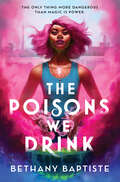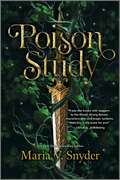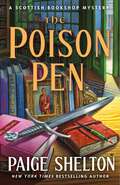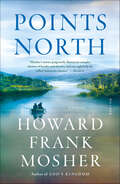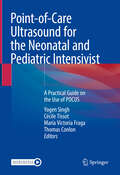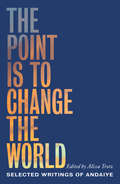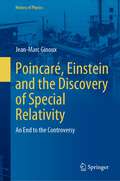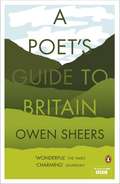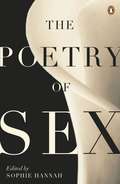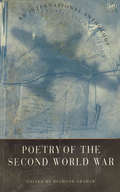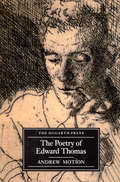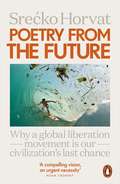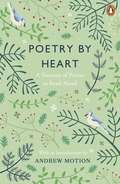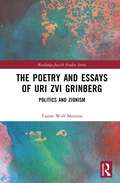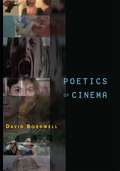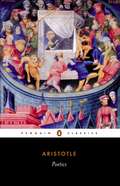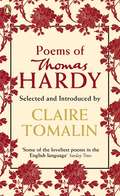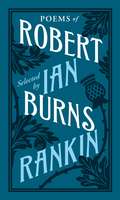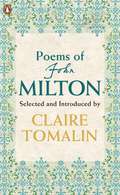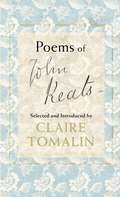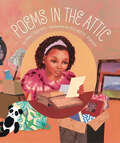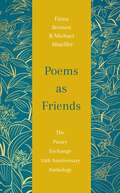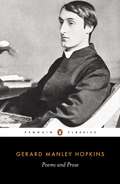- Table View
- List View
The Poisons We Drink
by Bethany BaptisteIn a country divided between humans and witchers, Venus Stoneheart hustles as a brewer making illegal love potions to support her family.Love potions is a dangerous business. Brewing has painful, debilitating side effects, and getting caught means death or a prison sentence. But what Venus is most afraid of is the dark, sentient magic within her.Then an enemy's iron bullet kills her mother, Venus's life implodes. Keeping her reckless little sister Janus safe is now her responsibility. When the powerful Grand Witcher, the ruthless head of her coven, offers Venus the chance to punish her mother's killer, she has to pay a steep price for revenge. The cost? Brew poisonous potions to enslave D.C.'s most influential politicians.As Venus crawls deeper into the corrupt underbelly of her city, the line between magic and power blurs, and it's hard to tell who to trust…Herself included.The Poisons We Drink is a potent YA debut about a world where love potions are weaponized against hate and prejudice, sisterhood is unbreakable, and self-love is life and death.
Poison Study: Magic Study / Poison Study / Fire Study (The Chronicles of Ixia #1)
by Maria V. SnyderChoose: a quick death… or slow poison…Locked deep in the palace dungeon for killing her abuser, Yelena knows she’ll never be free again. The laws in Ixia are strict, and murderers must be executed, no matter the reason. But just as she’s resigned herself to her fate, she’s offered an extraordinary reprieve.As the food taster, Yelena will eat the best meals, have rooms in the palace — and risk assassination by anyone trying to kill the Commander of Ixia. To make matters worse, the chief of security deliberately feeds her Butterfly’s Dust, and only by appearing for her daily antidote will she delay an agonizing death from the poison.As Yelena tries to escape her new dilemma, disasters keep mounting. Rebels plot to seize Ixia and Yelena develops magical powers she can’t control. Her life is threatened again, and in order to survive, she must unravel the secrets behind the past she’s been running from.Previously published.The Chronicles of Ixia Series by Maria V SnyderBook One: Poison StudyBook Two: Magic StudyBook Three: Fire StudyBook Four: Storm GlassBook Five: Sea GlassBook Six: Spy GlassBook Seven: Shadow StudyBook Eight: Night StudyBook Nine: Dawn Study
The Poison Pen: A Scottish Bookshop Mystery (A Scottish Bookshop Mystery #9)
by Paige SheltonThe Poison Pen, the ninth installment in the Scottish Bookshop series by Paige Shelton, set in a specialty bookstore in Edinburgh called The Cracked Spine.Edinburgh is mourning recent the death of Queen Elizabeth II when Bookseller Delaney Nichols's boss comes to her with a most unusual assignment. An old friend of his, living in an estate in the village of Roslin, has found what could be a priceless relic on her property, and Delaney is tasked with investigating. Could Jolie possibly have an item of breathtaking Scottish historical significance in her possession? But when Delaney arrives at Jolie's estate, she is greeted by a legal team with a vested interest in the property. Jolie manages to remove the interlopers, but as they're examining the priceless item, they hear a scream, and meet a much less welcome discovery: a body. As Delaney digs deeper, she discovers Jolie's own fascinating history. Jolie's mother had long claimed that her daughter was the rightful heir to the throne, not Elizabeth II, because of an affair she claimed to have with King Edward VIII. The only evidence, however, is in the form of a purported journal that one of Edward’s secretaries kept. The puzzles become more confusing when a connection is uncovered between this far-fetched story and the murdered man. Delaney will have to read between the lines to put together the pieces...or become history herself.
Points North: Stories
by Howard Frank MosherThe final book by one of America’s most treasured writers.Upon his passing in January 2017, Howard Frank Mosher was recognized as one of America’s most acclaimed writers. His fiction set in the world of Vermont’s fabled Northeast Kingdom chronicles the intertwining family histories of the natives, wanderers, outcasts, and others who settled in this ethereal place. In its obituary, The New York Times wrote, “Mr. Mosher’s fictional Kingdom County, Vt., became his New England version of Faulkner’s Yoknapatawpha County.” In Points North, completed just weeks before his death, Mosher presents a brilliant, lovingly-evoked collection of stories that center around the Kinneson family, ranging over decades of their history in the Kingdom. From a loquacious itinerant preacher who beguiles the reticent farmers and shopkeepers of a small New England town, to a proposed dam that threatens the river that Kinneson men have fished for generations, the scandalous secret of a romance and its violent consequences, and a young man’s seemingly fruitless search for love—Points North is a full-hearted, gently-comic, and beautifully-written last gift to the readers who treasure Howard Frank Mosher.
Point-of-Care Ultrasound for the Neonatal and Pediatric Intensivist: A Practical Guide on the Use of POCUS
by Yogen Singh Cécile Tissot María Victoria Fraga Thomas ConlonThis book, written by internationally renowned experts, is a comprehensive text covering all aspects and recommendations regarding the use of POCUS for critically ill neonates and children. Point of Care Ultrasound (POCUS) for the Neonatal and Pediatric Intensivist is structured to address and expand upon recently published international evidence-based POCUS guidelines endorsed by the European Society of Paediatric and Neonatal Intensive Care (ESPNIC). The book is richly illustrated and includes a robust collection of individual POCUS images and cases. The Electronic Supplementary Materials offer high quality and interesting video clips complementing reader learning, particularly for neonatology, pediatric critical care, and general pediatric providers. Chapter authors provide a practical, experience-based approach to clinical integration of POCUS applications and highlight relevant supportive literature as well as important limitations to POCUS use in the management of critically ill children. The information within the book is also intended to support further clinical and educational research in the practice of pediatric POCUS.
The Point Is to Change the World: Selected Writings of Andaiye (Black Critique Ser.)
by AndaiyeRadical activist, thinker, and comrade of Walter Rodney, Andaiye was one of the Caribbean’s most important political voices. For the first time, her writings are published in one collection. Through essays, letters, and journal entries, Andaiye’s thinking on the intersections of gender, race, class, and power are powerfully articulated, Caribbean histories emerge, and stories from a life lived at the barricades are revealed. We learn about the early years of the Working Peopl’s Alliance, the meaning asnd impact of the murder of Walter Rodney and the fall of the Grenada Revolution. Throughout, we bear witness to Andaiye’s acute understanding of politics rooted in communities and the daily lives of so-called ordinary people. Featuring forewords by Clem Seecharan and Robin DG Kelley, these texts will become vital tools in our own struggles to “overcome the power relations that are embedded in every unequal facet of our lives.”
Poincaré, Einstein and the Discovery of Special Relativity: An End to the Controversy (History of Physics)
by Jean-Marc Ginoux1905 is probably the best-known year in physics, since it was the year of the discovery of the special theory of relativity. For decades, historiography has told us that Albert Einstein, then a patent examiner in Bern, succeeded in developing this theory on his own, overcoming all the difficulties that the greatest scientists of his time had not been able to solve. However, some have pointed out that, before Einstein’s first publication in this field, the French mathematician and physicist Henri Poincaré had obtained the same results, which he had published several months before Einstein. Yet today, this theory is known as Einstein’s special theory of relativity. Thus, considering the indisputable anteriority of Poincaré’s contributions, there is only one real question that needs to be answered:Why didn’t Poincaré claim the authorship of special theory of relativity?After recapping on the ideas and concepts of the special theory of relativity in a manner accessibleto non-specialists and recalling the historical context of the discovery of this theory, we will answer this question and thus put finally an end to this long-running controversy.
A Poet's Guide to Britain
by Owen SheersIntroduced and selected by the poet-presenter Owen Sheers, A Poet's Guide to Britain is a major poetry anthology that ties in with the BBC series of the same name.Owen Sheers passionately believes that poems, and particularly poems of place, not only affect us as individuals, but can have the power to mark and define a collective experience - our identities, our country, our land. He has chosen six powerful poems, all personal favourites, and all poems that have become part of the way we see our landscape. The anthology follows a similar format to the BBC series itself, while also offering paper chains of poems about the landscape and nature of Britain, transcripts of contemporary poet interviews, and a short introduction to each lead poem.
The Poetry of Sex
by Sophie HannahThe Poetry of Sex - a raucous, highly enjoyable anthology by acclaimed poet Sophie Hannah 'We've been at it all summer, from the Canadian border to the edge of Mexico . . .'It's hard to imagine a more fruitful subject for poets than sex, in all its glorious manifestations: from desire and hope, through disappointment and confusion, to conclusion and consequence. And little has changed over the centuries, as Sophie Hannah's anthology vividly demonstrates, from Catullus pleading with Lesbos to Walt Whitman singing the body electric. Moods and attitudes may vary but the drive persists as does the desire to write about it.Sophie Hannah's selection ranges from ancient Rome to modern New York, from gay to straight, but her principle has been to go low on the sugar and high on the excitement. It is essential reading for poetry lovers and romantics everywhere. Sophie Hannah has published five collections of poetry. Her fifth Pessimism for Beginners was shortlisted for the T.S. Eliot Award in 2007. Her Selected Poems is published by Penguin (revised edition, 2013). She is also the writer of bestselling psychological crime fiction, most recently The Carrier. Her novels have been translated into 24 languages. Born in Manchester, she now lives in Cambridge with her husband and children, and is a Fellow Commoner of Lucy Cavendish College.
Poetry Of The Second World War
by Desmond GrahamPoetry of the Second World War brings to light a neglected chapter in world literature. In its chorus of haunting poetic voices, over a hundred of the most articulate minds of their generation record the true experience of the 1939-45 conflict, and its unending consequences. In keeping with its subject, it has an international scope, with poems from over twenty countries, including Japan, Australia, Europe, America and Russia; poems in which human responses echo each other across boundaries of culture and state. Auden, Brecht, Stevie Smith, Primo Levi, Zbigniew Herbert and Anna Akhmatova are set alongside the eloquence of unknown poets. The anthology has been arranged to bring out the chronological and cumulative human experience of the war: pre-war fears, air raids, the boredom, fear and camaraderie of military life; battle, occupation and resistance; surviving and the aftermath. Here at last, are the poems of the Holocaust, the Blitz, Hiroshima; of soldiers, refugees and disrupted lives. What emerges is a poetry capable of conveying the vast and terrible sweep of war.
The Poetry Of Edward Thomas
by Andrew MotionWhen Edward Thomas died at Arras in 1917 few people thought of him as a poet. Yet in the two years before his death, after a lifetime writing prose, Thomas wrote some of the most enduring poems of his day: poems of war, nature, friendship, despair and exultation. Andrew Motion's pioneering study of Thomas' life and achievement is scholarly yet utterly absorbing, combining an account of his struggles as a writer with perceptive readings of individual poems.Andrew Motion's books include a biography, The Lamberts, George, Constant and Kil, and several prize-winning collections of poetry, the most recent of which is Love in a Life. He is currently writing the authorized biography of Philip Larkin.
Poetry from the Future: Why a Global Liberation Movement Is Our Civilisation's Last Chance
by Srecko Horvat'A compelling vision, an urgent necessity, and not beyond reach' Noam ChomskyThe past is forgotten, and the future is without hope. Dystopia has become a reality. This is the new normal in our apocalyptic politics - but if we accept it, our helplessness is guaranteed. To bring about real change, argues activist and political philosopher Srecko Horvat, we must first transform our mindset.Ranging through time and space, from the partisan liberation movements of Nazi-occupied Yugoslavia to the contemporary culture, refugee camps and political frontlines of 21st century Europe, Horvat shows that the problems we face today are of an unprecedented nature. To solve them, he argues in this passionate call for a new radical internationalism, we must move beyond existing ways of thinking: beyond borders, national identities and the redundant narratives of the past. Only in this way can we create new models for living and, together, shape a more open and optimistic future.
Poetry by Heart: Poems for Learning and Reciting
by Andrew MotionPoetry by Heart - based on the hugely successful nationwide schools competition, 200 magical poems to learn by heart'The poems we learn stay with us for the rest of our lives. They become personal and invaluable, and what's more they are free gifts - there for the taking' Simon ArmitageTwo years ago former Poet Laureate Andrew Motion had the idea of setting up Poetry by Heart - a nationwide annual competition for secondary schools which asked contestants to learn two or three poems and be judged on their recitations, first at school level, then regional, then in a national final held at London's National Portrait Gallery. It's proved a huge success, with hundreds of schools participating in the first year, and numbers up by 20% in the second. Coinciding with the start of the third year of competition, and published on National Poetry Day whose theme coincidentally in 2014 is Recitation, this Poetry by Heart anthology brings together the pool of poems - 200 altogether - from which contestants make their choices. Specially picked by Motion and his three co-editors, these poems make up a treasure house - of almost-unknown poems and familiar poems from the mainstream; love poems and war poems; funny poems and heartbroken poems; poems that recreate the world we know and poems written on the dark side of the moon. And all chosen with a view to their being recited out loud.From William Wordsworth to Wilfred Owen, Emily Brontë to Elizabeth Bishop this wonderfully enjoyable anthology will be enjoyed by all ages and includes the best poets from the past to the present day. In a groundbreaking feature, the book includes QR codes which allow readers to use their mobile phones to listen to recordings of the poems - many of them specially recorded by the poets themselves. Sir Andrew Motion was Poet Laureate from 1999 till 2009, and is Professor of Creative Writing at Royal Holloway College, London. Jean Sprackland'sTilt won the Costa Poetry award in 2008. She is a Reader in Poetry at Manchester Metropolitan University. Julie Blake is co-Founder and Director of The Full English, an organization based in Bristol which provides support to teachers of English Literature. Mike Dixon is an educational consultant specializing in English in the classroom.
The Poetry and Essays of Uri Zvi Grinberg: Politics and Zionism (ISSN)
by Tamar Wolf-MonzonThis book focuses on the complex network of relationships between the poet Uri Zvi Grinberg and the Labor Movement in Mandate Palestine from 1923 to 1937.Making use of letters found in the Uri Zvi Grinberg Archive at the National Library of Israel (NLI), the author reconstructs the characteristics of Grinberg’s pioneer readership, attesting to their special relationship with his poetry. In the 1920s, it is argued, they considered Grinberg’s poetry an authentic expression of their complex spiritual world and especially of the reality of their lives. On his side, Grinberg accepted the pioneering ethos as the ideological basis of his works, becoming an outstanding poet of the Labor Movement. The chapters of this book track the various phases of Grinberg’s life and poetry, from his emigration to Palestine through to the 1930s, when he joined the Revisionist Movement and became increasingly ostracized from the Labor Movement. The story of Grinberg’s relations with the pioneers was emotionally charged—a mixture of enchantment and rejection, spiritual closeness and repulsion. Ultimately, this book analyzes the intensity of this connection and its many contradictory layers.This book will interest researchers in a range of fields, including Hebrew poetry and reception theory, as well as anyone interested in Israeli studies and the history of the Labor Movement in Palestine.
Poetics of Cinema
by David BordwellBringing together twenty-five years of work on what he has called the "historical poetics of cinema," David Bordwell presents an extended analysis of a key question for film studies: how are films made, in particular historical contexts, in order to achieve certain effects? For Bordwell, films are made things, existing within historical contexts, and aim to create determinate effects. Beginning with this central thesis, Bordwell works out a full understanding of how films channel and recast cultural influences for their cinematic purposes. With more than five hundred film stills, Poetics of Cinema is a must-have for any student of cinema.
Poetics
by AristotleOne of the most powerful, perceptive and influential works of criticism in Western literary history In his near-contemporary account of classical Greek tragedy, Aristotle examines the dramatic elements of plot, character, language and spectacle that combine to produce pity and fear in the audience, and asks why we derive pleasure from this apparently painful process. Taking examples from the plays of Aeschylus, Sophocles and Euripides, the Poetics introduced into literary criticism such central concepts as mimesis ('imitation'), hamartia ('error') and katharsis ('purification'). Aristotle explains how the most effective tragedies rely on complication and resolution, recognition and reversals. The Poetics has informed thinking about drama ever since.Translated with an Introduction and Notes by Malcolm Heath
Poems on the Underground
by Gerard Benson, Judith Chernaik and Cicely Herbert Gerard Benson Judith Chernaik Cicely HerbertThis wonderful new edition of Poems on the Underground is published to celebrate the 150th anniversary of the Underground in 2013. Here 230 poems old and new, romantic, comic and sublime explore such diverse topics as love, London, exile, families, dreams, war, music and the seasons, and feature poets from Sappho to Carol Ann Duffy and Wendy Cope, including Chaucer and Shakespeare, Milton, Blake and Shelley, Whitman and Dickinson, Yeats and Auden, Seamus Heaney and Derek Walcott and a host of younger poets. It includes a new foreword and over two dozen poems not included in previous anthologies.
Poems of Thomas Hardy
by Thomas HardyThomas Hardy wrote some of the most moving and personal poems in his era and this collection brings together the best of his verse on life and love.Hardy's poems are by turn haunting, intense, songlike humerous and tender. From snatched lovers' meetings to the wreck of the Titanic from the death of a Dorest drummer boy in the Boer War to memories of his dead wife Emma, from ghosts, loss and longing to pleasure in landscape and weather, they tell the story of one of our best-loved writers, and the people and places that inspired him.
Poems of Robert Burns Selected by Ian Rankin
by Robert BurnsThe farmer’s boy from Ayrshire who went on to be the most acclaimed of all Scottish poets, celebrated around the world, Robert Burns is a greater and more varied artist than those that know him only through annual Burns’ Suppers and choruses of his ‘Auld Lang Syne’ at New Year could imagine. This new selection by Ian Rankin of verses and lyrics from Scotland’s national poet, the ‘Heaven-taught ploughman’, reveals a writer capable of evoking tremendous sympathetic power from his readers and with an easy, astonishing command of the sounds and rhythms of both standard English and the evocative Scots tongue. It also reveals an artist of incredible range. His ‘Tam O’ Shanter’, with its midnight pursuit of witches from a grisly graveyard dance, is gripping, fantastical and funny in equal measure, ‘Is there for honest poverty’ beautifully expresses the egalitarian spirit by which Burns became a political hero for so many, and sentiments both romantic (‘Ae Fond Kiss’) and bawdy (‘The Fornicator’) co-exist in this canny selection of the best of the Scottish Bard.
Poems of John Milton
by John MiltonJohn Milton was a master of almost every type of verse, from the classical to the religious and from the lyrical to the epic. This is a new selection of his poems, edited and introduced by Claire Tomalin.
Poems of John Keats
by John KeatsOver the course of his short life, John Keats (1795-1821) honed a raw talent into a brilliant poetic maturity. By the end of his brief career, he had written poems of such beauty, imagination and generosity of spirit, that he had - unwittingly - fulfilled his wish that he should 'be among the English poets after my death'. This new, wide-ranging selection of Keats's poetry has been selected by Claire Tomalin.
Poems in the Attic
by Nikki GrimesAward-winning poet Nikki Grimes presents a tender poetry collection where a young girl learns about her mother, the child of an Air Force serviceman.During a visit to her grandma's house, a young girl discovers a box of poems in the attic, poems written by her mother when she was growing up. Her mother's family often moved around the United States and the world because her mother's father was in the Air Force. Over the years, her mother used poetry to record everything she saw and did in the many places their family lived. Reading the poems and sharing those experiences through her mother's eyes, the young girl feels closer to her mother than ever before. To let her mother know this, she creates a gift: a book with her own poems and copies of her mother's. And when she returns her mother's poems to the box in the attic, she leaves her own poems too, for someone else to find, someday. Using free verse for the young girl's poems and tanka for her mother's, master poet Nikki Grimes creates a tender intergenerational story that speaks to every child's need to hold onto special memories of home, no matter where that place might be.
Poems as Friends: The Poetry Exchange 10th Anniversary Anthology
by Fiona Bennett Michael ShaefferThe Poetry Exchange is an award-winning podcast and project that celebrates the role poetry plays in people's lives. In their first anthology, Fiona Bennett and Michael Shaeffer draw on ten years of archival material to bring together a collection of poems chosen by readers that know them as friends, presented alongside their personal stories of connection. Featuring Brian Cox on John Clare, Andrew Scott on George Herbert, Maxine Peake on Tony Harrison and many more, in this gathering of poems you can reacquaint yourself with old friends, perhaps make some new ones, and enjoy the companionship poetry can offer us. Friends that offer connection and solidarity.Friends that help us wrestle with difficult things.Friends that name our experiences.Friends that comfort and help us move forward.Friends we admire.
Poems as Friends: The Poetry Exchange 10th Anniversary Anthology
by Fiona Bennett Michael ShaefferThe Poetry Exchange is an award-winning podcast and project that celebrates the role poetry plays in people's lives. In their first anthology, Fiona Bennett and Michael Shaeffer draw on ten years of archival material to bring together a collection of poems chosen by readers that know them as friends, presented alongside their personal stories of connection. Featuring Brian Cox on John Clare, Andrew Scott on George Herbert, Maxine Peake on Tony Harrison and many more, in this gathering of poems you can reacquaint yourself with old friends, perhaps make some new ones, and enjoy the companionship poetry can offer us. Friends that offer connection and solidarity.Friends that help us wrestle with difficult things.Friends that name our experiences.Friends that comfort and help us move forward.Friends we admire.
Poems and Prose (Everyman's Library Pocket Poets Ser.)
by Gerard HopkinsCloser to Dylan Thomas than Matthew Arnold in his 'creative violence' and insistence on the sound of poetry, Gerard Manley Hopkins was no staid, conventional Victorian. On entering the Society of Jesus at the age of twenty-four, he burnt all his poetry and 'resolved to write no more, as not belonging to my profession, unless by the wishes of my superiors'. The poems, letters and journal entries selected for this edition were written in the following twenty years of his life, and published posthumously in 1918. His verse is wrought from the creative tensions and paradoxes of a poet-priest who wanted to evoke the spiritual essence of nature sensuously, and to communicate this revelation in natural language and speech-rhythms while using condensed, innovative diction and all the skills of poetic artifice.
